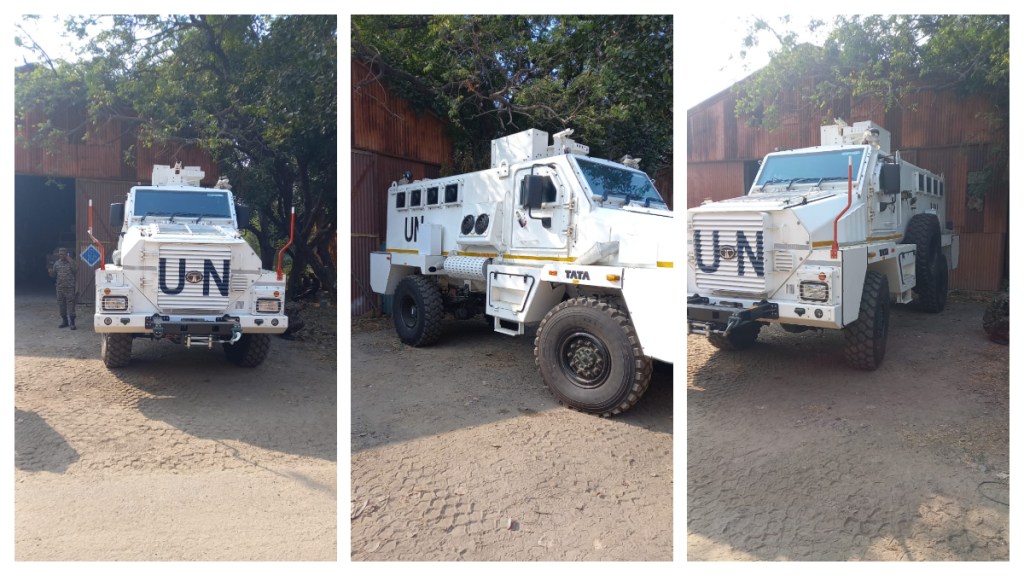In a significant development, 45 high-tech Tata-built Quick Reaction Force (QRF) vehicles are en route to Lebanon, set to be inducted on January 15, coinciding with India’s Army Day. These vehicles are part of a larger consignment of 62 Tata vehicles being sent to support the Indian Army’s peacekeeping mission in Lebanon under the United Nations Interim Force in Lebanon (UNIFIL). This marks the first-time use of Tata vehicles under a wet lease, replacing the Swedish SISU vehicles previously utilized by Indian forces in the region.
The Swedish SISU Vehicles: The Predecessor
Before the arrival of the Tata vehicles, the Indian Army in Lebanon relied on SISU vehicles, a rugged and reliable line of military trucks manufactured in Finland by the SISU Auto company. The SISU vehicles were primarily used for transporting troops, cargo, and providing logistical support to the Indian contingent stationed along the Israel-Lebanon border.
The SISU 8×8 trucks, known for their exceptional durability and off-road capabilities, were particularly valued for their ability to navigate the challenging and rugged terrain of the region. These vehicles were used by Indian peacekeepers to support a variety of missions, including quick-response operations, medical evacuations, and resupply missions. However, with evolving operational requirements and a push for greater self-reliance, the Indian Army has opted for Tata-built vehicles, which offer improved performance and additional customization suited to the specific needs of peacekeeping missions.
The New Tata Vehicles: A Step Forward in Operational Readiness
The vehicles being delivered to Lebanon from Tata Motors include a wide range of specialized equipment: ambulances, utility cargo trucks, recovery vehicles, 2.5-tonne trucks, and medium ambulances. These vehicles are designed to enhance the operational capabilities of the Indian contingent, which currently has 600 soldiers stationed in the region under UNIFIL.
This marks the first-time use of Tata vehicles under a wet lease, a model that allows the vehicles to be rented on a long-term basis, providing flexibility and support for the Indian Army’s logistical needs. By integrating Tata vehicles into their operations, the Indian Army gains better mobility, reliability, and operational efficiency, thanks to Tata’s proven track record in manufacturing military-grade vehicles.
The Role of Indian Forces in Lebanon
Amid rising tensions between Hezbollah and Israel, the Indian Army plays a crucial role as part of UNIFIL, tasked with maintaining peace and stability in this conflict-prone region. The Blue Line, a 120-kilometer demarcation running between Israel and Lebanon, serves as a buffer zone where only UN peacekeepers, including the Indian contingent, are deployed. The Indian forces, while not engaged in combat, are responsible for monitoring compliance with the UN’s peacekeeping mandates and ensuring that violence does not escalate.
Currently, the Indian soldiers are stationed in the Tyre area, which is approximately 30 kilometers from the Israeli border. While the influence of Hezbollah in this region is minimal, the group remains active in nearby areas, especially in Shia-dominated zones. Hezbollah’s continued presence in Lebanon has heightened tensions, with reports of missile preparations and rocket attacks against Israel. In response, Israel’s Defense Forces have conducted preemptive strikes, targeting Hezbollah’s infrastructure. Despite these escalations, the Indian peacekeepers’ mandate remains non-combatant, focused on monitoring and preventing violence.
The Impact of Tata Vehicles on UNIFIL Operations
The induction of Tata vehicles is a significant step forward in enhancing the operational readiness and mobility of Indian peacekeepers. With the previous reliance on Swedish-made SISU vehicles, these new Tata vehicles offer improved performance, durability, and better capacity to handle the rough terrain and complex logistics of peacekeeping operations.
This transition to Tata vehicles will improve the efficiency of logistics, medical evacuation, and quick response operations, which are crucial in a region characterized by frequent skirmishes and instability. Furthermore, the inclusion of specialized vehicles like recovery trucks and ambulances ensures that the Indian contingent is better equipped to respond to any unforeseen challenges during their deployment.
India’s Role in Maintaining Regional Stability
The Indian Army’s long-standing presence in Lebanon is a testament to India’s commitment to global peace and security. While the situation on the ground remains volatile, the presence of Indian forces acts as a stabilizing influence, offering a buffer against the potential spread of hostilities between Israel and Hezbollah.
UNIFIL’s peacekeeping forces are divided into two main sectors—East and West—with India contributing significantly to the West sector. The peacekeepers, while largely tasked with observing and reporting violations of the ceasefire agreements, also ensure the safety of other UN missions in the region. India’s participation in UNIFIL underscores its role as a key contributor to global peacekeeping efforts and its dedication to maintaining the fragile peace along the Blue Line.

